|
|
|
Sort Order |
|
|
|
Items / Page
|
|
|
|
|
|
|
| Srl | Item |
| 1 |
ID:
078777
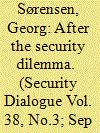

|
|
|
|
|
| Publication |
2007.
|
| Summary/Abstract |
The security dilemma - which raises the imminent risk of war between sovereign states - has always been considered the core issue of international relations. But, the security dilemma is in decline. Interstate war is no longer the supreme concern on the international security agenda. Instead, new dilemmas have emerged, in particular the insecurity dilemma and the associated value dilemma. The insecurity dilemma poses a looming risk of violent domestic conflict in weak states. The related value dilemma concerns the ambiguous content of core liberal values. Negative liberty is autonomy, self-determination and the ability to act unimpeded by others. The promotion of negative liberty calls for non-intervention. Positive liberty is removal of the obstacles that stand in liberty's way: oppression, poverty, ignorance and tyranny. The promotion of positive liberty calls for intervention. Emphasizing negative liberty creates grave problems; emphasizing positive liberty creates grave problems of a different kind. Compromises between intervention and non-intervention must always be troubled and uneasy, because they involve trade-offs between liberal values that are all desirable. There is no clear path to a more liberal world order
|
|
|
|
|
|
|
|
|
|
|
|
|
|
|
|
| 2 |
ID:
078775
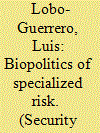

|
|
|
|
|
| Publication |
2007.
|
| Summary/Abstract |
This article offers a biopolitical security analytic of kidnap and ransom (K&R) insurance. It suggests that security phenomena should be analysed in terms of the problematizations through which they are expressed. With reference to Foucault's concept of biopower, K&R insurance is studied as part of a security dispositif designed to deal with the problematic of kidnap risk. The biopolitical security that results is aimed at enabling the circulation of the client should a kidnap event occur. As such, it is a personalized private provision of security premised upon the promotion of an individual's capacity to circulate in the future. Using the story of a kidnap event, the article analyses the micro-practices through which a population of `kidnapping prospects' is created, the underwriting process through which prospective clients undergo a security audit, and the forms of security that derive from this dispositif. It argues that the value of the concept of biopower for security analysis is its potential for explaining problematics that are not circumscribed to a fixed referent object but relate to the emergent features of the changing character of the human being
|
|
|
|
|
|
|
|
|
|
|
|
|
|
|
|
| 3 |
ID:
078776
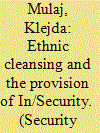

|
|
|
|
|
| Publication |
2007.
|
| Summary/Abstract |
The phenomenon of ethnic cleansing has either been considered by analysts from the point of view of history, or (ethnic) nationalism, or interpreted as the dark side of democracy. Underemphasized in the literature has been the link between the expulsion of targeted communities and the policy and practice of security. Yet, at various times, ethnic cleansing has been used as a security-creation mechanism in the process of nation-state building. Prioritization of the state in security policy and practice has provided justification for drastic measures against targeted peoples. This article seeks to offer a critique of the official rationale for the expulsion of targeted communities in terms of security. It contends that ethnic cleansing is flawed as a means of securing national security. Indeed, not only has ethnic cleansing resulted in humanitarian catastrophe, but the attainment of its stated objective - namely, the provision of security - can be unfeasible. Although state security remains an important value, its acquisition may no longer be justified independently of the means employed in its pursuit.
|
|
|
|
|
|
|
|
|
|
|
|
|
|
|
|
| 4 |
ID:
078774
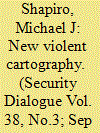

|
|
|
|
|
| Publication |
2007.
|
| Summary/Abstract |
Mapping the `new violent cartography', an inter-articulation of geographic imaginaries and antagonisms, based on models of identity-difference, this article begins with the analysis of a piece of photo-journalism, an image of a US soldier in a bombed-out bunker during the war in Afghanistan, and goes on to trace the institutions that are part of the contemporary aspects of militarization and securitization constituting the `war on terror'. The article ends with an analysis of the anti-war impetus of cinema and the cinematic spaces of film festivals
|
|
|
|
|
|
|
|
|
|
|
|
|
|
|
|
| 5 |
ID:
078778
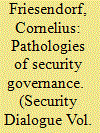

|
|
|
|
|
| Publication |
2007.
|
| Summary/Abstract |
The trafficking of women and girls for the purpose of sexual exploitation has reportedly been booming in Europe since the 1990s. Governments, international organizations, and private actors have addressed the causes and consequences of sex trafficking in various ways. This article shows that the concept of security governance helps to understand efforts against human trafficking and their shortcomings. The anti-trafficking security governance system consists of five approaches: legal measures, prosecution, protection, prevention in countries of origin, and prevention in countries of destination. Although progress has been made, the security governance system is marked by several pathologies, especially a lack of programs that prevent trafficking in countries of origin and destination, insufficient protection for trafficked persons, and deficient networks bringing together the various actors involved in anti-trafficking. To make governance against human trafficking more effective, efficient, and just, the security governance system must be better balanced and networked
|
|
|
|
|
|
|
|
|
|
|
|
|
|
|
|
|
|
|
|
|